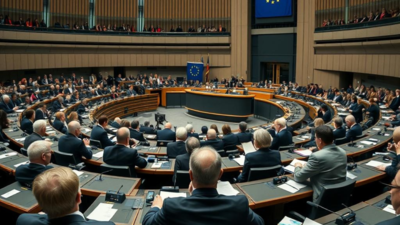European Union on Wednesday unveiled a new push to “simplify” its environmental regulations in a bid to provide businesses with more flexibility in the face of growing competition from the United States and China.
The move comes as the EU seeks to decarbonize its economy while addressing concerns over sluggish economic growth, marking a shift from the climate-focused agenda that dominated EU chief Ursula von der Leyen’s first mandate.
This shift has become more urgent as US President Donald Trump’s “America First” strategy creates potential trade tensions between the EU and the US.
Stephane Sejourne, the EU’s industry chief, stated that Europe was aiming to “simplify” its green business rules to boost the competitiveness of its companies without resorting to drastic measures. He emphasized that Europe would reform itself without a “chainsaw,” referencing figures like Elon Musk of the US and Argentina’s Javier Milei, who have used the symbol of a saw for their calls for bold reform.
Teresa Ribera, the EU’s vice president for the clean transition, assured the press that these changes would not undermine the EU’s green goals, emphasizing the union’s commitment to sustainability alongside economic growth.
Pressure from Businesses and Governments
Businesses, along with key EU powers like France and Germany, have long pressured Brussels to ease regulatory burdens and lower energy costs, which are currently higher than in the US With Trump moving away from his predecessor’s push for clean tech investment, the EU sees an opportunity to position itself as a global leader in green technology.
As part of the new initiative, the European Commission announced a package of measures aimed at reducing red tape, cutting energy costs, and boosting the clean tech sector through a “Clean Industrial Deal.” One of the first measures calls for member states to lower taxes on electricity bills to ease the financial burden on consumers and businesses.
EU plans to scale back several recent rules on environmental and human rights supply chain standards that were seen as too cumbersome for businesses. These regulations, passed just months ago, are now under scrutiny for their perceived impact on business operations.
Easing the Burden on Businesses
Two major regulations are now under review: the Corporate Sustainability Reporting Directive (CSRD), which requires large companies to disclose information about their climate impact and efforts to mitigate emissions, and the Corporate Sustainability Due Diligence Directive (CSDDD), which mandates companies to address human rights and environmental issues within their global supply chains.
The European Commission’s new proposals as reported by Reuters aim to modify the scope of these requirements:
Approximately 80% of the companies originally covered by the CSRD would be excluded, applying the rules only to firms with more than 1,000 employees. The CSRD was initially designed to cover about 50,000 companies with over 250 employees.
The same exemption would apply to the EU’s “taxonomy,” which determines what qualifies as climate-friendly investments. Only companies with over 1,000 employees would be required to report on how their business aligns with these taxonomy criteria.
Small and medium-sized companies will be allowed to refuse providing certain data to larger companies requesting it for their CSRD compliance. The CSRD is already in effect for the largest companies, some of which will begin publishing their first reports in 2025.
These proposals will now need approval from EU member states and the European Parliament.
Due Diligence
The Commission’s proposals also seek to scale back Europe’s Corporate Sustainability Due Diligence Directive (CSDDD), which, starting in 2027, will require companies to identify and address human rights and environmental issues in their supply chains. The proposed changes include:
Carbon Border Levy
Starting in 2026, companies importing steel, cement, and other goods into the EU will face a carbon border fee (CBAM) on the imported emissions in their products. The new proposals include:
A Balancing Act
While the European Commission reiterated its commitment to achieving carbon neutrality by 2050 and cutting greenhouse gas emissions by 55% by 2030, the new proposals are expected to spark debate within the European Parliament. Some centrists, left-wing, and green lawmakers have voiced opposition to weakening environmental rules. However, some liberals, such as French centrist Marie-Pierre Vedrenne, have expressed regret over the original regulations, acknowledging that they may have been a “mistake.”
“The world is completely changing,” Vedrenne said. “I think we need to admit, sometimes we make mistakes.”
Meanwhile, the parliament’s socialist group urged Brussels to reconsider its approach, signaling the contentious nature of the upcoming debate.
Environmental groups have criticized the proposed changes, arguing that weakening the rules could undermine the efforts of businesses that are already investing heavily in sustainability.
Amandine Van Den Berghe from the environmental law NGO ClientEarth warned that such a shift would harm companies committed to sustainability and compliance with existing legislation. “If the race is a race to the bottom, we won’t win,” she said.

